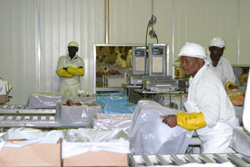You are here » Home » Telling Our Story
Success Story
State-owned monopoly pays cattle producers higher prices
Cattle Farmers Get Higher Prices

| |
Photo: USAID/Lisa Yarmoshuk
|
|
Meat packers prepare beef for export at the Botswana Meat Commission’s abattoir in Lobatse, Botswana.
USAID’s trade hub in Southern Africa supports cattle producers as they lobby for changes to Botswana’s beef export policies. In December 2005, they saw the first results — the Botswana Meat Commission monopoly increased the price it would pay to producers by an average of 40 percent.
|
In an effort to revitalize Botswana’s struggling cattle industry and increase incentives for raising cattle, the state-owned Botswana Meat Commission, which holds a monopoly on beef exports, has increased the prices it pays to producers by an average of 40 percent in the first seven months of 2006.
The price increase comes at a time when the Botswana cattle sector is facing significant difficulties for a number of reasons, including declining exports. The sector’s share in exports has fallen by more than 50 percent — from 3.4 percent in 1998 to only 1.3 percent in 2003 and 1.5 percent in 2004. Revenue from beef exports reached a record low in 2003 of $30 million, down from $63 million in 1998.
The cattle industry is the mainstay of Botswana’s rural economy, where an estimated 20-25 percent of the country’s households are involved in cattle rearing as owners or employees. But the industry has been failing recently, in part because the state-owned monopoly gets to set cattle prices.
In 2005, USAID helped cattle producers form a national association to represent and promote their economic interests. USAID’s Southern Africa trade hub provided technical support to create the Botswana Cattle Producers Association and provided a set of recommendations, which included increasing the price of cattle. The effort appears to be paying off; government attempts to boost the cattle industry, including the price increases, are in line with USAID’s recommendations. The low prices paid for cattle were one of the main impediments to the industry’s economic viability and expansion. Increasing that price is expected to spur the industry’s growth by encouraging more investments in cattle rearing. Furthermore, the agricultural ministry has indicated that government has left the door open for further reviews of its policies on the cattle industry and, potentially, more price increases for producers.
Within a year of its creation, the Botswana Cattle Producers Association is giving cattle farmers a strong voice and is increasingly recognized as a key partner by the government. The cattle industry still has a long journey ahead before it returns to profitability, but at least it is on the right path.
Print-friendly version of this page (444kb - PDF)
Click here for high-res photo
Back to Top ^ | 

